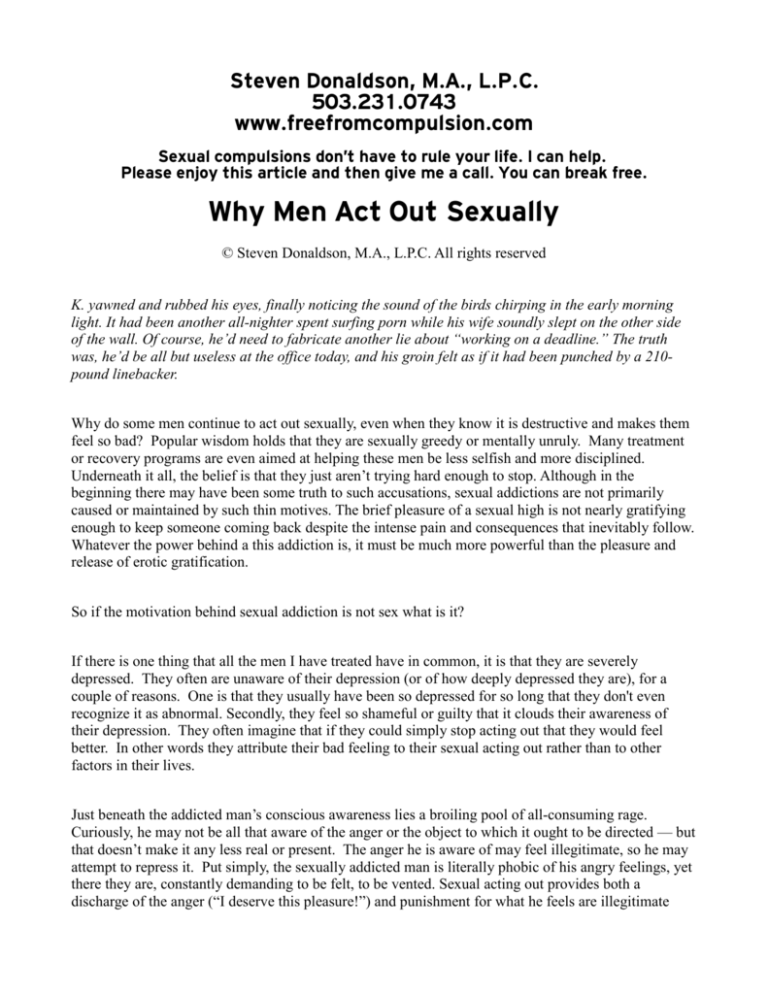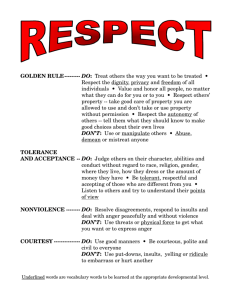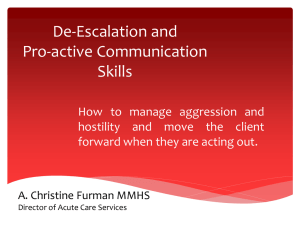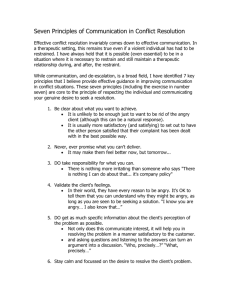
Steven Donaldson, M.A., L.P.C.
503.231.0743
www.freefromcompulsion.com
Sexual compulsions don't have to rule your life. I can help.
Please enjoy this article and then give me a call. You can break free.
Why Men Act Out Sexually
© Steven Donaldson, M.A., L.P.C. All rights reserved
K. yawned and rubbed his eyes, finally noticing the sound of the birds chirping in the early morning
light. It had been another all-nighter spent surfing porn while his wife soundly slept on the other side
of the wall. Of course, he’d need to fabricate another lie about “working on a deadline.” The truth
was, he’d be all but useless at the office today, and his groin felt as if it had been punched by a 210pound linebacker.
Why do some men continue to act out sexually, even when they know it is destructive and makes them
feel so bad? Popular wisdom holds that they are sexually greedy or mentally unruly. Many treatment
or recovery programs are even aimed at helping these men be less selfish and more disciplined.
Underneath it all, the belief is that they just aren’t trying hard enough to stop. Although in the
beginning there may have been some truth to such accusations, sexual addictions are not primarily
caused or maintained by such thin motives. The brief pleasure of a sexual high is not nearly gratifying
enough to keep someone coming back despite the intense pain and consequences that inevitably follow.
Whatever the power behind a this addiction is, it must be much more powerful than the pleasure and
release of erotic gratification.
So if the motivation behind sexual addiction is not sex what is it?
If there is one thing that all the men I have treated have in common, it is that they are severely
depressed. They often are unaware of their depression (or of how deeply depressed they are), for a
couple of reasons. One is that they usually have been so depressed for so long that they don't even
recognize it as abnormal. Secondly, they feel so shameful or guilty that it clouds their awareness of
their depression. They often imagine that if they could simply stop acting out that they would feel
better. In other words they attribute their bad feeling to their sexual acting out rather than to other
factors in their lives.
Just beneath the addicted man’s conscious awareness lies a broiling pool of all-consuming rage.
Curiously, he may not be all that aware of the anger or the object to which it ought to be directed — but
that doesn’t make it any less real or present. The anger he is aware of may feel illegitimate, so he may
attempt to repress it. Put simply, the sexually addicted man is literally phobic of his angry feelings, yet
there they are, constantly demanding to be felt, to be vented. Sexual acting out provides both a
discharge of the anger (“I deserve this pleasure!”) and punishment for what he feels are illegitimate
wishes and longings (“I really am a screw-up!”). The acting out makes him feel shameful. The shame
in turn allows him to continue to be compliant with people and systems that unconsciously he hates.
This cycle of compliance, repression, acting out and becoming shameful — followed by more
compliance — becomes endless and exhausting. Thus trapped, how could hopelessness and depression
not set in?
Sexually addicted men feel anxious, uncomfortable in their own skin. Part of this is due to the fact that
they are doing things they are ashamed of and do not want to get caught. But the story doesn’t end
there. They literally feel anxious about being angry or disliking things in their lives. For example,
many of the men I have worked with were being treated badly in their marriages, by their extended
families or in-laws, or were in jobs they hated. They typically don't believe they have the right to be
angry or demand change, so they repress or split off the angry feelings. They literally pretend that they
don't have them and conflict arises between their desire to express their anger and the fear that doing so
will yield dire consequences. Every time angry feelings well up, they employ strong defenses to repress
the anger — and the grinding gears of anxiety are set in motion.
This pattern is usually so persistent from childhood that they do not even recognize it. I have never met
a sexually addicted man who came from a high functioning, emotionally attuned family. Like most
people they usually come into my office believing that their family is normal. None of us is equipped
objectively judge to our own family. The instinct to believe that our parents were essentially good and
that they loved us is so strong that even people who were badly abused as children continue to believe
that their family was normal into adulthood. For some, surviving childhood meant attuning to the
parent's emotional needs at the expense of his own. This was the beginning of a lifelong pattern of
compliance in the service of maintaining a connection. The pattern starts so early that the addicted man
seldom recognizes it in himself. Predictably, this leads to resentment. If resentment is allowed to grow
unchecked it emerges into full blown rage. If the rage remains unintegrated (that is, it is
unacknowledged), it comes out in some form of acting out or tantruming. On the other hand if he can
understand, legitimize and use his anger effectively, he will make changes to his life and find real
satisfaction. To be sure, compliance and the willingness to yield to the wishes of others have their
place in our lives. But so do assertiveness, self-respect and, yes, anger. This is the goal of therapy — to
make the anger conscious, overcome the anxiety associated with it and then use it to bring about
changes in life.
No matter what the source of the anxiety, the sexually addicted man has a built-in habit of moving
away from outward expressions of anger, turning it inward until it metastasizes into shame. He is sure
he has done something wrong, he feels guilty, he obsesses and eventually he wants to act out. Acting
out effectively represses the anger and induces shame. The shame then leads to more over compliance.
What he needs learn is to be comfortable with his anger. When he is feeling anxious he is probably
being violated by someone. The problem is that he doesn't have permission to feel angry, which would
lead to making changes (stopping the violation). Instead, he feels shameful, which makes him want to
comply and reassure himself that he is acceptable. Repression of anger and over compliance lead to the
overwhelming urge to act out. The three components that seem present to me in all the men I work
with are disowned rage, shame and hopelessness. The three components work together to produce a
cycle of depression followed by acting out followed by still more depression. At its core, the problem
is that these men have been separated from their legitimate feelings and permission to act on these
feelings to make changes in their lives. Both the sexually addicted man and the treatment programs
that wish to help him often believe the answer is to repress sexual feelings which in effect represses the
rage. Unfortunately this is exactly the wrong impulse, and this leads to still more failure and
hopelessness.









